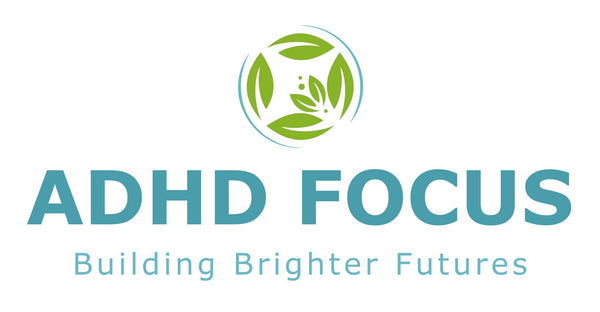
The ADHD Gut-Brain Connection: Why Digestive Health Matters
Share
ADHD and Gut Health
Attention-Deficit/Hyperactivity Disorder (ADHD) is often viewed as a neurological condition, but emerging research suggests that gut health plays a significant role in ADHD symptoms. The gut and brain are closely linked through the gut-brain axis, and imbalances in the gut microbiome can affect cognition, mood, and behavior.
In this blog, we explore how digestive health influences ADHD and what natural strategies can support both gut balance and cognitive function.
Understanding the Gut-Brain Axis
The gut-brain axis is a bi-directional communication system linking the digestive system with the brain through the vagus nerve, hormones, and immune system signals. When the gut microbiome (the trillions of bacteria residing in the intestines) is balanced, it supports healthy brain function, emotional regulation, and attention span.
However, gut dysbiosis (an imbalance of gut bacteria) can lead to inflammation, poor neurotransmitter production, and increased ADHD symptoms such as impulsivity, hyperactivity, and difficulty focusing.
The Link Between Gut Health and ADHD
1. Gut Dysbiosis and Neurotransmitter Imbalances
A few years ago, I worked with an 8-year-old boy named Liam, whose ADHD symptoms included extreme impulsivity and difficulty focusing in school. Despite various interventions, his symptoms persisted. We incorporated probiotics, reduced processed foods, and added nutrient-dense meals and his parents reported improved concentration and fewer emotional outbursts.
Healthy gut bacteria play a critical role in producing neurotransmitters such as dopamine and serotonin, which regulate mood, focus, and motivation. Many children with ADHD have low dopamine levels, and gut dysfunction may be a contributing factor (Turnbaugh et al., 2006; Foster et al., 2017).
2. Leaky Gut and Inflammation
A condition known as leaky gut syndrome occurs when the gut lining becomes permeable, allowing toxins and undigested food particles to enter the bloodstream. This can trigger chronic inflammation, which has been linked to ADHD and other neurodevelopmental disorders (Bischoff, 2011; Mayer et al., 2014).
One of my teenage patients, Sarah, struggled with severe mood swings and hyperactivity. After following a gut-healing protocol, including bone broth, omega-3 fatty acids, and removing inflammatory foods like gluten and dairy, her hyperactivity decreased significantly, and she was able to complete tasks more efficiently at school.
3. Food Sensitivities and Behavioral Reactions
I recall working with a 6-year-old girl, Emily, whose parents were at their wit’s end due to her constant restlessness and difficulty following instructions. After an elimination diet supervised by a homeopath, they discovered that dairy was a significant trigger. Within a few weeks of eliminating dairy, Emily’s teachers noticed a marked improvement in her ability to sit still and focus on her work.
Certain foods can exacerbate ADHD symptoms due to gut imbalances. Common triggers include:
- Artificial additives and preservatives (McCann et al., 2007)
- Processed sugars (Wolraich et al., 1994)
- Dairy and gluten (for some children) (Piwowarczyk et al., 2020)
- High-inflammatory foods (Kidd, 2000)
Natural Strategies to Improve Gut Health for ADHD
1. Increase Probiotic and Prebiotic Foods
Probiotics (beneficial bacteria) and prebiotics (fiber that feeds good bacteria) help restore gut balance.
- Best probiotic-rich foods: Yogurt (dairy or dairy-free), sauerkraut, kimchi, kefir, and miso (Dinan et al., 2013).
- Best prebiotic foods: Bananas, onions, garlic, asparagus, and flaxseeds.
2. Reduce Processed Foods and Artificial Additives
Eliminating artificial preservatives, dyes, and processed sugars can significantly reduce hyperactivity and improve focus in children with ADHD (Pelsser et al., 2011).
3. Support Gut Healing with Nutrient-Dense Foods
- Omega-3 fatty acids (found in flaxseeds, chia seeds, and walnuts) support brain function (Richardson & Montgomery, 2005).
- Zinc, magnesium, and iron are crucial for neurotransmitter production (Starobrat-Hermelin & Kozielec, 1997).
- Bone broth and collagen-rich foods help heal leaky gut. For vegan-friendly alternatives, consider incorporating foods rich in glycine and proline, such as seaweed, soy-based foods (like tempeh and tofu), and legumes. Additionally, plant-based collagen boosters like silica-rich foods (bananas, oats, and cucumbers) and vitamin C-rich fruits can support natural collagen production. (Wang et al., 2019).
One child I worked with had been on ADHD medication for years, but his symptoms persisted. His parents introduced omega-3-rich foods, and after two months, they reported that he had better impulse control and needed fewer reminders to complete tasks.
4. Manage Stress Levels
A 9-year-old boy, Jason, had extreme difficulty regulating his emotions, often leading to classroom disruptions. Alongside gut-healing dietary changes, his parents introduced daily mindfulness exercises. Within weeks, Jason's emotional meltdowns significantly reduced, and his ability to transition between activities improved.
Chronic stress affects gut health and can worsen ADHD symptoms. Encourage relaxation techniques such as:
- Deep breathing exercises
- Mindfulness and meditation
- Outdoor play and movement (Basso & Suzuki, 2017)
5. Consider a High-Quality Probiotic Supplement
For children who struggle with digestive health, a high-quality probiotic supplement can help rebalance gut bacteria and support ADHD management (Parracho et al., 2005).
Final Thoughts
The gut-brain connection is a vital but often overlooked factor in ADHD treatment. By addressing gut health through nutrition, probiotics, and lifestyle adjustments, parents can support their child's focus, mood, and overall well-being naturally.
If your child struggles with ADHD symptoms, consider working with a holistic health practitioner to develop a personalized gut-healing plan.
